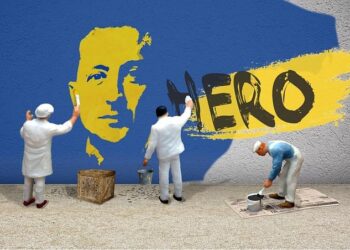In a world overshadowed by conflict and humanitarian crises, the call for peace echoes louder than ever. Cardinal Pietro Parolin, the Vatican’s secretary of State, has recently emphasized the urgency of renewed ceasefire talks between Ukraine and Russia, advocating for a just and lasting resolution to the ongoing war that has wrought devastating consequences for millions. In a statement to Vatican News, Cardinal Parolin outlined the moral imperative of dialogue, underscoring the role of the international community in facilitating negotiations aimed at restoring peace in the region. As global attention remains focused on the unfolding complexities of this conflict, the Cardinal’s appeal for a diplomatic solution reinvigorates hope for a future where reconciliation outweighs animosity.This article explores the meaning of Cardinal Parolin’s remarks and the potential paths forward in the search for enduring peace.
Cardinal Parolin Advocates for Peaceful Resolution in Ukraine-Russia Conflict
In a heartfelt address, Cardinal Pietro Parolin emphasized the necessity of dialogue in the ongoing Ukraine-Russia crisis, advocating for a peaceful resolution that embraces the dignity and rights of all individuals affected by the conflict. Underlining the dire humanitarian situation, he stated that negotiations are essential for restoring trust between both nations and creating conditions conducive to lasting peace. He urged global leaders to remain steadfast in their efforts to support a ceasefire, highlighting the importance of compassion and understanding in overcoming mistrust and fostering mutual respect.
Cardinal Parolin also pointed to the broader implications of the conflict, warning that its escalation threatens not only regional stability but global peace. He articulated a vision where collaborative initiatives could pave the way for rebuilding communities and facilitating a return to normalcy. The Cardinal’s call encapsulated several key points:
- Humanitarian Aid: The need for increased assistance to those displaced or affected by the war.
- International collaboration: Encouraging nations to unite in their support for diplomatic efforts.
- faith and Solidarity: Reinforcing the role of religious organizations in promoting peace and reconciliation.

The Role of Vatican Diplomacy in Ceasefire Negotiations
The Vatican has long positioned itself as a mediator in international conflicts,leveraging its unique diplomatic status to foster dialogue and encourage peace. In the complex landscape of Ukraine-russia ceasefire negotiations, Vatican diplomacy is characterized by a commitment to humanitarian principles and moral persuasion. Cardinal Pietro Parolin, the Vatican’s Secretary of State, emphasizes that open-ended discussions should seek to incorporate key principles for a just resolution, which include:
- Respect for sovereignty: Ensuring that both nations recognize and uphold the territorial rights and independence of one another.
- Human rights protection: Advocating for the safeguarding of civilian lives and addressing the humanitarian crises resulting from the conflict.
- Dialogue and reconciliation: Promoting ongoing conversations to foster understanding and rebuild relationships between communities.
Vatican diplomacy also serves as a conduit for broader engagement with global entities, enhancing the prospects for peace. By collaborating with organizations such as the United Nations and various non-governmental organizations, the Vatican aims to create a framework that supports sustained dialogue. The involvement of the Holy See highlights a commitment to multilateral approaches in resolving conflicts. A well-coordinated effort not only benefits immediate ceasefire talks but also lays the groundwork for long-term stability through initiatives such as:
| Initiative | Description |
|---|---|
| Peacebuilding Workshops | Facilitating workshops that encourage dialogue among conflicting parties. |
| Humanitarian Aid Coordination | streamlining efforts to deliver aid to affected populations. |
| Interfaith Dialogue | Encouraging religious leaders to foster peace through common values. |

Assessing the Stakes: Humanitarian Consequences of Ongoing Hostilities
The relentless hostilities between Ukraine and Russia have triggered a humanitarian crisis of unprecedented proportions. As the conflict drags on, countless lives are caught in the crossfire, leading to dire consequences that extend far beyond the battlefield. The ongoing violence has resulted in:
- Displacement: Millions of civilians have been uprooted from their homes, seeking refuge both within Ukraine and in neighboring countries.
- Access to Basic Needs: Essential services such as healthcare, food, and clean water have become elusive for many, exacerbating the plight of vulnerable populations.
- Psychological Impact: The trauma and anxiety inflicted by constant warfare are leaving deep psychological scars on the civilian population, particularly children.
Furthermore,the stark reality of the ongoing warfare poses meaningful challenges for humanitarian organizations striving to deliver aid. The precarious security situation, coupled with obstructive bureaucratic hurdles, has hindered timely assistance. In light of these challenges, it is imperative to foster dialogue and seek solutions that prioritize human dignity and safety. Initiatives aimed at negotiating a ceasefire could pave the way for:
- Stabilization: A ceasefire can restore a degree of normalcy, allowing humanitarian agencies to safely provide assistance.
- trust-building: Dialogues can bolster trust among communities, facilitating collaborative efforts for peacebuilding.
- Investment in Reconstruction: Peace talks could open avenues for international support in rebuilding war-torn regions.

A Path to Lasting Peace: Key Recommendations for Ceasefire Talks
In pursuit of a sustainable resolution to the ongoing conflict, it is imperative for negotiators to prioritize meaningful dialogue, fostering an atmosphere of trust between both parties. Effective ceasefire talks must focus on the following key factors:
- Inclusivity: All stakeholders, including civil society and affected communities, should be represented to ensure that the voices of those most impacted are heard.
- Transparency: Open channels of communication can build confidence, reducing suspicions or fears that may undermine the peace process.
- Verification Mechanisms: Establishing neutral parties to monitor compliance with ceasefire terms is essential for maintaining accountability.
- humanitarian Access: Immediate attention must be given to enabling aid deliveries and supporting displaced populations, showing a commitment to alleviating human suffering.
The international community plays a crucial role in supporting these efforts by offering diplomatic resources and expertise. Facilitators of the talks should consider:
| Recommendations | Actions |
|---|---|
| Encourage bilateral negotiations | Organise regular meetings with independent mediators |
| Promote confidence-building measures | Implement small-scale collaborative initiatives between communities |
| Ensure ongoing support | Commit to long-term peacebuilding initiatives beyond the ceasefire |

International Communitys Responsibility in Supporting Peace Initiatives
The call for global solidarity in affirming peace initiatives cannot be overstated, especially in the context of ongoing conflicts that impact innocent lives. The international community holds a crucial role in mediating dialogues and fostering a culture of understanding between nations. This responsibility entails not only diplomatic engagement but also mobilizing resources to support humanitarian efforts. To effectively contribute, global actors must prioritize the following actions:
- Facilitating Dialogue – Establishing platforms for negotiation and engagement between conflicting parties.
- Resource Allocation – Providing financial and logistical support for peacekeeping missions and reconstruction efforts.
- Promoting Human Rights – Advocating for the protection of civilian populations and upholding international norms.
- Encouraging Collaboration – engaging regional organizations to leverage local knowledge and relationships.
As Cardinal Parolin emphasizes, any ceasefire must be viewed as a stepping stone to a just and lasting resolution. therefore, the emphasis on a collective strategy is paramount. Engaging in peace negotiations requires an inclusive approach that encompasses diverse voices while seeking to address underlying grievances. The following principles can guide effective international support:
| Principle | Impact |
|---|---|
| accountability | Ensures that violations are addressed and justice is served. |
| Transparency | Builds trust in the peace process and fosters cooperation. |
| Inclusivity | Ensures that all stakeholder perspectives are considered. |
| Sustainability | Promotes long-term solutions rather than temporary ceasefires. |

The Importance of Dialogue: engaging Local Voices in the Peace Process
In the quest for peace, the participation of local voices is paramount. Engaging communities directly affected by conflict fosters a deeper understanding of grievances, aspirations, and the unique cultural contexts that shape their realities. When local voices are included, the peace process gains authenticity and legitimacy, making it more likely that agreements will be embraced and sustained in the long term. The integration of diverse perspectives can led to more extensive solutions,addressing not only the immediate cessation of hostilities but also the underlying issues that fuel the conflict.
To effectively incorporate local perspectives, it is essential to establish inclusive dialogue platforms that allow for meaningful participation. These can take various forms, including:
- Community forums for open discussions
- Workshops to build consensus on key issues
- Mediation sessions involving local leaders and stakeholders
Such initiatives not only empower individuals but also strengthen the social fabric of communities devastated by war.additionally, creating channels for feedback ensures that the peace process remains responsive and adaptable to the evolving needs and insights of the peopel it aims to serve.
Future outlook
Cardinal Pietro Parolin’s call for renewed ceasefire talks between Ukraine and Russia underscores the Vatican’s commitment to peace and dialogue in the face of ongoing conflict. As the situation remains precarious, his statement serves as a reminder of the importance of diplomatic efforts that prioritize human dignity and the need for a comprehensive resolution. By advocating for a just and lasting peace, the Cardinal emphasizes that the path forward must be characterized by mutual understanding and respect for the sovereignty of nations. As stakeholders continue to grapple with the complexities of this international crisis, the Vatican stands as a beacon of hope, encouraging all parties involved to engage in meaningful conversations that pave the way for a brighter future for the people of Ukraine and Russia alike. The world looks on as these talks unfold, hopeful that they may yield the enduring peace so desperately needed in the region.
















